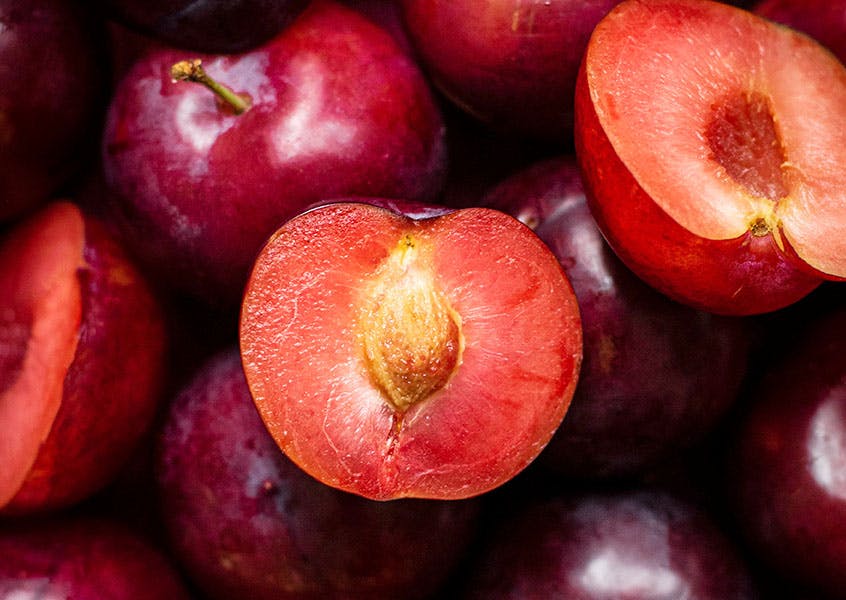Plums are a close relative of fruits like prunes, peaches, and almonds. They are small-sized fruits that have a delicious sweet taste when ripe and are packed with health benefits. They are not only tasty but also versatile for various culinary uses. Today, we'll explore which plums are beneficial and what advantages they offer.
What do plums look like?
Plums are highly nutritious and healthy fruits. They are medium-sized fruits that come in various colors depending on the variety, including green, purple, yellow, and even black. They have a sweet taste, and when some of these fruits are dried through a drying process, they are known as prunes. Prunes are even richer in minerals and fiber and have a longer shelf life due to their lower water content per unit weight, making them denser compared to other fruits.
Differences in Nutrient Content between Plums and Prunes
For 100 grams of plums, they provide 46 kilocalories of energy and consist of 10 grams of sugar, 11 grams of carbohydrates, 1 gram of protein, 0 grams of fat, along with vitamins A, K, and C, magnesium, and various other minerals. On the other hand, 100 grams of prunes, which have been dried, provide 230 kilocalories of energy and comprise 61 grams of carbohydrates, 38 grams of sugar, 2.2 grams of protein, 0.4 grams of fat, along with vitamins A, C, and K, magnesium, and various other minerals.
It's worth noting that prunes contain higher amounts of carbohydrates, sugar, and calories compared to fresh plums. However, both plums and prunes offer similar beneficial nutrients for the body.
Benefits of Plums
Blood Pressure Regulation and Heart Health: Plums contain potassium, which helps regulate heart rate and blood pressure, reducing the risk of stroke and heart disease. Additionally, phytochemicals in plums help reduce inflammation, a contributing factor to heart disease.
Cancer Prevention: Plums contain anthocyanins, which can help prevent cancer and inhibit the spread of cancer cells, including Prostate and skin cancers.
Weight Management: Plums are low in calories and have a sweet taste without significantly raising blood sugar and insulin levels, making them suitable for weight management.
Bone Health: Plums are a good source of vitamin K, phosphorus, and calcium, which contribute to bone health. They help reduce bone loss and support bone recovery more effectively than apples, kiwis, and avocados.
Relief from Constipation: Plums are rich in dietary fiber, aiding in the treatment of constipation. They also contain phenolic compounds with laxative properties, which help improve digestion and bowel movements.
· Moderation is Key: Overconsumption of plums or not being mindful of portion sizes can lead to gastrointestinal discomfort, such as gas and diarrhea. Swallowing dried or whole plums can also cause intestinal blockages.
· Not Suitable for Kidney Patients: Plums are rich in potassium, which might not be appropriate for individuals with kidney issues. Kidneys may struggle to eliminate excess potassium, increasing the risk of hyperkalemia. Therefore, people with kidney disease should exercise caution when consuming plums.
· Allergies: Individuals with allergies to closely related fruits like peaches, apricots, or cherries may also be allergic to plums. In such cases, be cautious when consuming plums, as they contain a variety of minerals and may cause gastrointestinal discomfort. If a child experiences severe constipation, it's possible to dilute plum juice before consumption.
In scorching weather like this, having a refreshing smoothie on the table to sip and recharge during work can be quite delightful. If it's a beverage that combines benefits and helps beat the heat, then it's a top choice. Today, we're sharing a plum smoothie recipe.
Ingredients:
· 15 plums
· 6 ice cubes
· 2 tablespoons of water
· 150 grams of yogurt
Instructions:
· Wash the plums thoroughly and blend them with yogurt.
· Add water and ice cubes. If the smoothie is too thick, you can add more water to adjust the consistency.
· Pour into a glass and serve.
In summary, whether it's plums or dried plums (prunes), they are the same type of fruit. If you're using dried and preserved plums, they are referred to as prunes. Plums and prunes are readily available in most markets and come in various processed products, offering a wide range of nutritious benefits. Don't forget to try making this plum smoothie for your friends or loved ones. For Krungthai-AXA customers interested in health care, you can read more health articles at https://www.krungthai-axa.co.th/th/health-advisories
References
· An Affair from the Heart
· WebMD
· Medthai
· Verywell Fit


